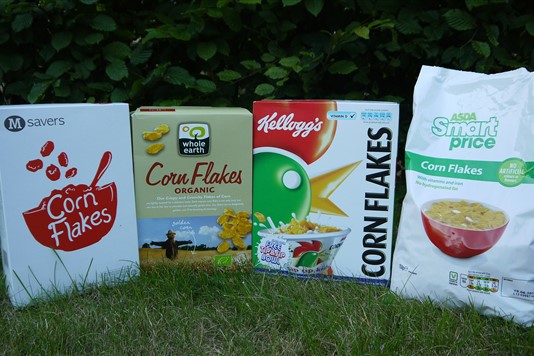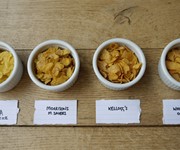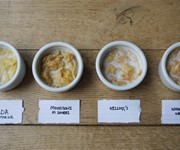Basic Britain: Cornflakes

Corn flakes are corn flakes right? So why do we pick the brands above the budget? Laura Rowe takes a look at four different makes of the popular breakfast cereal.
Like so many of the great things in life, the original corn flakes came about accidentally. It is said that the founders of Kellogg’s, or the Battle Creek Toasted Corn Flakes Company as it was originally known, were trying to create healthy, bland foods for an American sanitarium and a case of waste not, want not, created the original form of the cereal we know and love today.
But how much has changed since that original recipe of toasted flaked corn? And how do supermarket versions compare to the might that is Kellogg’s? This week I looked at:
ASDA Smart Price Corn Flakes 46p/750g
Morrisons M-Saver Corn Flakes 31p/500g
Kellogg’s Corn Flakes £1.98/500g
Whole Earth’s Organic Corn Flakes £1.49/375g
Box clever?
The most noticeable difference between the two supermarket budget ranges and the branded cereals, is the packaging. ASDA Smart Price has opted for a non-recyclable plastic bag. You might think that this would result in a crushed corn flake but these little chaps survived surprisingly well. Yes, there were a few crumbs at the bottom of the bag but the majority held their shape. Morrisons M-Saver were packaged up in a box but to a very simple design and colour palette. The cardboard can be recycled widely while for the plastic bag inside, which holds the cereal, it is recommended that you check your local recycling facilities. Kellogg’s box and bag packaging offers similar advice, although interestingly uses a 4cm-wider box than Morrisons even though they hold the same weight product. Whole Earth is again boxed and bagged and uses recycled cardboard, which can be recycled again. Whole Earth has also been given the CarbonNeutral status by The CarbonNeutral Company thanks to its investment in environmental projects.
Crunch time

In terms of crunch, they all came up to par. ASDA was definitely the thinnest but still had good bite, Morrisons’ flakes had quite large bubbles in them as if they were popped, while Kellogg’s were surprisingly irregular in size. I also did a “soggy cereal” test – ASDA lost their crunch quickest at around 4 minutes after adding milk, while Whole Earth were still crunchy at more than six minutes.

What else is in there?
Thought corn flakes were just corn – you’d be wrong. Kellogg’s, ASDA and Morrisons all ‘fortify’ their cereal with vitamins and minerals. Kellogg’s, which uses corn from Argentina, has been doing it for 50 years. This addition to the maize lets them “provide additional nutrients to the food and help address shortfalls in the nation’s diet”. So, whether you like it or not, eating your daily corn flakes can include anything from Iron and Vitamin D to Folic Acid. Each of these cereals also contains gluten. Whole Earth, on the other hand, which sources its organic maize from Italy, chooses not to add anything to their cereal, except for soya lecithin. This is an emulsifier and is “used as a processing aid”. This organic cereal is gluten free.
Morrisons wins the prize for the least sugar (7.4g/30g serving), ASDA for the least salt (0.2g/30g) and least saturated fat (1.1g/30g). Whole Earth surprisingly has the most salt (0.6g/30g), Morrisons and Kellogg’s have the most saturated fat (1.5g/30g) and Kellogg’s has the most sugar (9g/30g). All of these figures are based on a 30g serving with 125ml semi-skimmed milk.
The cost of your breakfast
ASDA is the cheapest of the bunch at only 6.1p per 100g – a cost they say is down to the packaging (or lack of) and because they “don’t spend large amounts of money on advertising and marketing”. Morrisons costs 6.2p per 100g but its team couldn’t tell me how it managed to produce such an affordable product so we can only assume it’s the packaging and not to do with product quality. Kellogg’s and Whole Earth come in at the same price of 39p per 100g.
So, do you always go for the same cereal? Did you know you can get organic for the same price as Kellogg’s? Or are you prepared to go budget? Let us know in the comments box below.
Morn articles you might like
Breakfast cereals are full of sugar, says Which?
Comments
Be the first to comment
Do you want to comment on this article? You need to be signed in for this feature